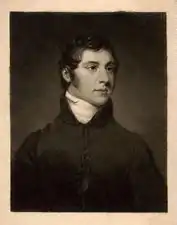William Abbot (actor)
William Abbot or Abbott (12 June 1790 – 1 June 1843) was an English actor, and a theatrical manager, both in England and the United States.[1][2]
William Abbot | |
|---|---|
 William Abbot | |
| Born | 12 June 1790 |
| Died | 7 June 1843 |
| Occupation(s) | actor, theatrical manager |
Life
Abbot was born in Chelsea just outside London, and made his first appearance on the stage at Bath in 1806, and his first London appearance in 1808, at the Haymarket Theatre, in a benefit performance.[1] There he appeared as Frederick in an 1809 production of Lovers' Vows.[2] At the Covent Garden Theatre in 1813, in light comedy and melodrama, he made his first definite success.[1] He was Pylades to William Charles Macready's Orestes in Ambrose Philips's Distressed Mother when Macready made his first appearance there, in 1816. He created the parts of Appius Claudius in Sheridan Knowles's Virginius (1820) and of Modus in his The Hunchback (1832).[3]
In 1827 Abbot organized the company, including Harriet Smithson, which acted Shakespeare in Paris. His position was as stage manager; he performed at the Salle Favart, but not to plaudits.[1] On his return to London he played Romeo to Fanny Kemble's Juliet (1830). Two of Abbot's melodramas, The Youthful Days of Frederick the Great (1817) and Swedish Patriotism (1819), were produced at Covent Garden.[3]
Abbot also worked in America, where he first appeared as "Mr. Beverly" in an 1832 production of The Gamester at the Park Theatre in New York.[2] Later he moved to Charleston, South Carolina, where he created the New Charleston Theatre and operated it from 1837 through 1841. This theatre brought stars like Ellen Tree to the company there, but did not enjoy major success.[1]
William Abbot probably died in New York on 7 June 1843,[1][2] although some sources say that he died in Baltimore, Maryland.[3] He had married an actress, Elizabeth Bradshaw née Buloid.[1]
Selected roles
- Albert in Adelaide by Richard Sheil (1816)
- Prince Royal in The Youthful Days of Frederick the Great by William Abbot (1817)
- Young Bowerscort in A Word to the Ladies by James Kenney (1818)
- Hafiz in Retribution by John Dillon (1818)
- King of Naples in Evadne by Richard Sheil (1819)
- Captain Albert in Swedish Patriotism by William Abbot (1819)
- Appius Claudius in Virginius by James Sheridan Knowles (1820)
- Montieth in Wallace by Charles Edward Walker (1820)
- Dionysius in Damon and Pythias by John Banim and Richard Sheil (1821)
- Count D'Alba in Julian by Mary Russell Mitford (1823)
- Modus in The Hunchback by James Sheridan Knowles (1832)
- Clement Marot in Francis the First by Fanny Kemble (1832)
- Lorenzo in The Wife by James Sheridan Knowles (1833)
- Charles I in Charles the First by Mary Russell Mitford (1834)
References
- Cockin, Katharine. "Abbot, William". Oxford Dictionary of National Biography (online ed.). Oxford University Press. doi:10.1093/ref:odnb/10. (Subscription or UK public library membership required.)
- WEMYSS, Francis Courtney (1852). Wemyss' Chronology of the American Stage, from 1752 to 1852. W. Taylor&Company. p. 19.
- Chisholm 1911.
- Who Was Who in America, Historical Volume 1607–1896. Chicago: Marquis Who's Who, 1963.
Attribution
This article incorporates text from a publication now in the public domain: Chisholm, Hugh, ed. (1911). "Abbot, William". Encyclopædia Britannica. Vol. 1 (11th ed.). Cambridge University Press. p. 23.
![]() This article incorporates text from a publication now in the public domain: Cook, Edward Dutton (1885). "Abbot, William". In Stephen, Leslie (ed.). Dictionary of National Biography. Vol. 1. London: Smith, Elder & Co.
This article incorporates text from a publication now in the public domain: Cook, Edward Dutton (1885). "Abbot, William". In Stephen, Leslie (ed.). Dictionary of National Biography. Vol. 1. London: Smith, Elder & Co.